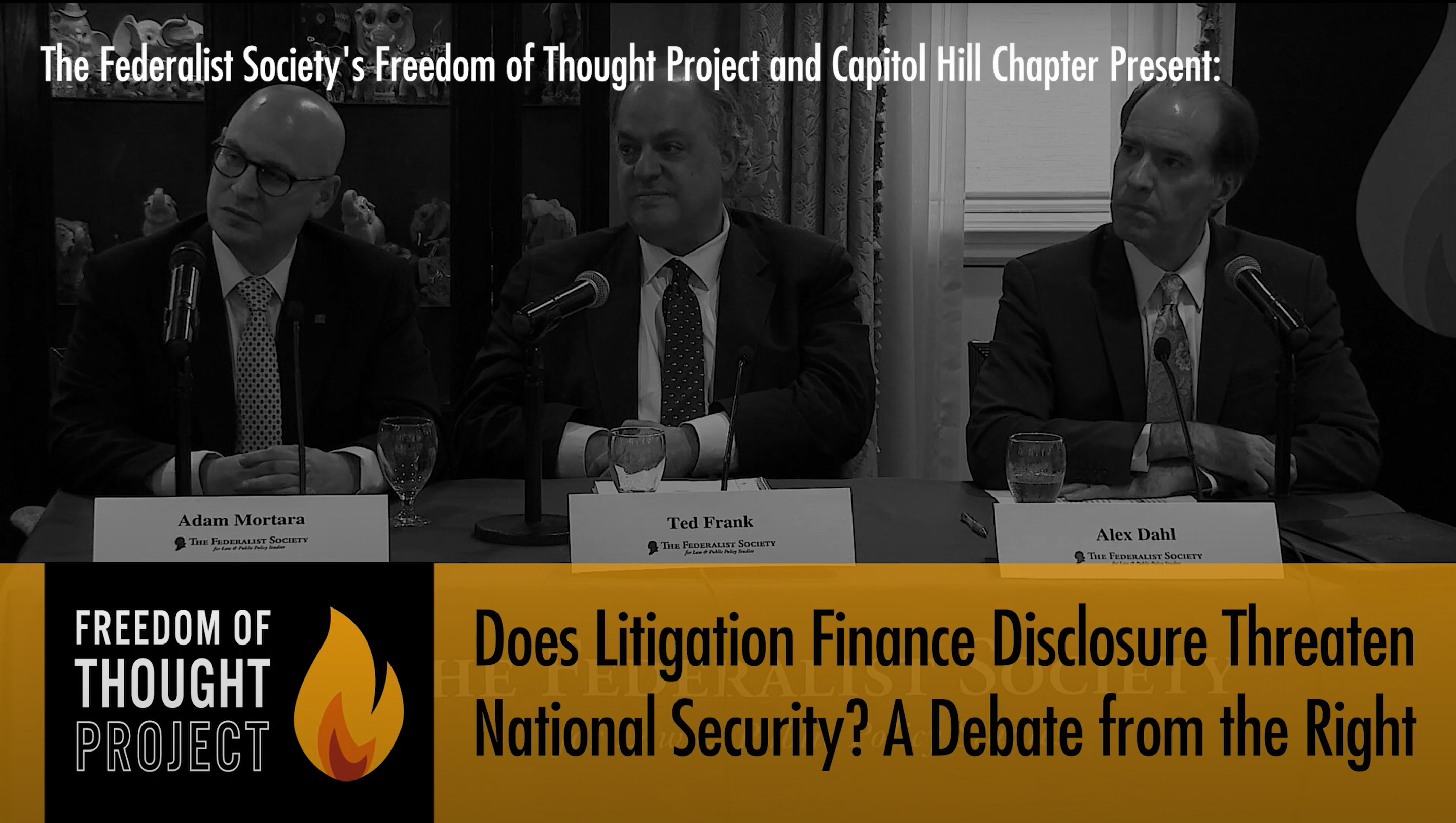Does Litigation Finance Disclosure Threaten National Security? A Debate from the Right

Event Video
Event Description
Arguments over third-party litigation funding are nothing new. Opponents have argued the funding promotes frivolous litigation and might distort efficient settlement of claims, while the litigation finance companies argue they are providing the capital that allows meritorious claims to be effectively litigated.
Most recently, opponents have raised a new concern – could investments by foreign entities threaten national security, if it supports excess litigation against critical US businesses? These critics are calling for disclosure of the investors behind any such litigation.
How might such disclosure requirements affect financial support for litigation, and access to capital for important litigation?
How should we evaluate the risks and benefits of a new disclosure mandate and how might it affect support for politically charged litigation?
Featuring:
Adam Mortara, Partner and Lecturer
Alex Dahl, General Counsel, Lawyers for Civil Justice
Moderator: Ted Frank, Director of Litigation and Senior Attorney, Hamilton Lincoln Law Institute
Event Transcript
Does Litigation Finance Disclosure Threaten National Security? A Debate from the Right
[Music]
Alida Kass: Hi, everyone. I want to welcome you all to our program today on third-party litigation funding sponsored by The Federalist Society’s Capitol Hill Chapter and the Freedom of Thought Project.
I’m Alida Kass, Vice President for Strategic Initiatives and Director of the Freedom of Thought Project: an effort to explore and address new forms of ideological coercion and other threats to thought and conscious that have emerged. And there is a QR code on the table outside if you’d like to sign up to find out more. I would really love that and encourage you to do so.
So today’s program will focus on third-party litigation funding. This is not a new question. Concerns about third-party litigation have longer than a decade’s pedigree. But the program today really will focus on some new questions: Does third-party litigation funding present a threat to national security? And could the proposed remedy of disclosure interfere with access to the capital for meritorious and important litigation?
It’s especially interesting to see that the concerns do not break cleanly along ideological lines. And I am delighted to be hosting this intra-right discussion.
Also, appreciate my friend Ted Frank, who will be our moderator today. Ted is the Director of the Hamilton Lincoln Law Institute and the Center for Class Action Fairness. He is well known to many in this room for his work addressing distortions and inequities in class action litigation. He’s, of course, a graduate of the University of Chicago Law School, former clerk to Judge Easterbrook. And there is really no one better to moderate today’s discussion. I will turn it over to Ted to introduce the panel. Thank you all very much.
Ted Frank: Thank you, Alida. To my left is Alex Dahl, who is outside General Counsel to Lawyers for Civil Justice—the corporate and defense bar coalition for civil justice reform. He’s a former shareholder at Brownstein Hyatt Farber Schreck and was Deputy Staff Director and Senior Counsel to the Senate Judiciary Committee under Senator Hatch. He founded The Federalist Society chapter at University of Utah Quinney College of Law, where he serves on the Board of Trustees.
To my right—and probably everybody’s right —
[Laughter]
Adam Mortara: Huzzah.
Ted Frank: Adam Mortara graduated with highest honors from the University of Chicago Law School, where he’s been a lecturer since 2007. He has clerked for Justice Thomas and was a partner at Bartlit Beck, where he argued in the Supreme Court twice and tried Students For Fair Admissions v. Harvard in the trial court. He has since founded Lawfair LLC, a firm in Nashville. And I want to be Adam when I grow up, but Alex Dahl has written more amicus briefs opposing cy près.
[Laughter]
Ted Frank: We’ll start it off with Alex.
Alex Dahl: Thank you, Ted. It’s great to be here with you and with The Federalist Society and to meet Adam. Because this is a Federalist Society event and therefore you are all presumably interested in traditional and original understanding of law, I am going to begin with an observation about our American legal tradition.
Going back to the common law and incorporated into many state laws at the time of the founding is that investing by nonparties in someone else’s lawsuit has not only been disallowed but actually a crime, a tort, and a violation of ethics rules. Blackstone described it as “an offense against public justice, as it keeps alive strife and contention and perverts the remedial process of law into an engine of oppression.”
Now, as some of your state laws may have been changed, some might still exist but are not particularly enforced. But nevertheless, today’s topic isn’t whether that tradition should be — is good or bad. But rather, the far simpler question—thank goodness—of whether — since funding is now pervasive in our courts, whether the courts and parties should know about it.
My view is that it’s very important that nonparty investments in civil cases be disclosed to courts and parties and that doing so by a straightforward uniform rule would be just as uncomplicated and routine as the rule requiring disclosure of insurance agreements, which was enacted in 1970—so 53 years of litigation history. And I assume that insurance companies are not beating down doors on Capitol Hill saying that the disclosure requirement is ruining their business or putting them out of business. The sky will not fall if a disclosure rule is in fact passed.
In fact, I believe that a disclosure rule is inevitable. We have passed peak nondisclosure, as the finance people might say. The future is more disclosure, not less. And the real question is, what kind of disclosure is needed, and who is going to write the rule, and in what circumstances—whether it will be a thoughtful approach formed in — with consideration or a panicked and sudden overreaction to some egregious abuse, which right now might seem more likely as an impetus for the rule writing?
But the principle behind this is that non-party funding of lawsuits always raises important questions. A stranger to a dispute who now owns some or all of the cause of action of somebody else inherently has different interests than the actual party. And the focus of this question is really a matter of control.
Well, it’s a fundamental idea in American civil justice that if you’re sued, you should know who is bringing the suit. And I think that if this were a personal matter for you, you would probably want to know whether the party on the other side of whatever action that you’re facing is actually a multibillion dollar hedge fund who is funding the discovery and the motion practice and everything else.
Almost as fundamental to our system is the idea that courts must know who the decision makers are in the cases before them in order to manage the litigation, requiring presence of decision makers at certain key stages of the case, including settlement conferences.
I mean, if you were the judge—and I know at least somebody in our audience is—wouldn’t you want to know? For those of you who work on the Hill who may well become judges, let me ask you this. Someone comes into your office and wants to talk about putting a provision on a telecommunications bill or maybe a social media antitrust legislation. Wouldn’t you want to know if that person is actually an agent of a foreign state before deciding whether to recommend to your boss if that particular provision would be a good fit for the bill?
Well, what if that same person after meeting with you walks down the street and puts $10 million into somebody else’s lawsuit and is in front of the court asking for discovery and remedies and other things? Wouldn’t the judge want to know?
The fact is the current rules of civil procedure actually require judges to know, even though they don’t provide a mechanism for learning. Judges have a duty to avoid conflicts of interest, and it is possible that in this area that judges or their families or whoever might actually have an investment or an interest in somebody that has an investment in funds. We’re no longer in a state where it’s only a couple of specialized companies offering this kind of investment.
Rule 26(b)(1) requires judges to consider “the resources of the parties” when deciding whether to order particular discovery requests. The rules allowing judges to allocate cost and impose sanctions presume knowledge about the control — who has control and a financial interest in the case.
And most directly in Ted Franks special area, Rule 23, which governs class actions, gives judges the duty to make sure that any settlement is fair, reasonable, and adequate to the class members. It would be awfully tough to do that if you didn’t know whether or not the plaintiff’s lawyers have agreed to give a portion or somebody else owns a portion of the settlement that’s going to someone else who is not a class member.
So the answers to these questions may not be problematic in every case because they are kept secret. We don’t really know. But one thing I think I do know is that every single agreement that has come to light in our court system has had a control problem.
So what does all this mean to national security? Well, let’s go back to the Blackstone comment that nonparty investment keeps alive strife and contention and perverts the remedial process of the law into an engine of oppression. Senator Kennedy’s letter to the attorney general and the chief justice points out the enormous loophole.
Transfers of funding from foreign entities in and out of the United States are governed by such laws as CFIUS, and there’s the FARA requirement I alluded to earlier that requires disclosure of foreign engagement in U.S. government. The U.S. Chambers report about third-party funding mentions that Russia, China, and Iran, and others are subject to various anti-money laundering and other rules.
And former Texas representative Dick Armey says that “TPLF can weaponize our patent system.” Well, what are the risks? The obvious one perhaps is that access of information can occur through discovery. That’s what discovery is and routinely accomplishes in civil litigation.
So let’s say this as a little thought piece. What if North Korea secretly invests in somebody’s patented suit against a defense contractor where there’s discovery into anti-ballistic missile technology? And one answer by the funders is, “Well, that could never happen because the judge will issue a protective order.”
So maybe I’ve been watching The Americans too much, but it’s hard to imagine an episode where Phil and Elizabeth Jennings are looking at the table of a lawyer that they’ve given $10 million to, and there’s a big envelope of trade secrets, and they think, “We better read the language of the protective order before we decide whether we should look in that envelope.”
Even outside this discovery problem, litigation itself can always help achieve — can help achieve strategic goals. First of all, it is always expensive to be involved in a lawsuit, and that is a competitive advantage by itself. Think about commodities and natural resource businesses. There are lots of state-owned oil companies and natural resources companies around the world. They have a competitive advantage if the price of somebody else to produce the same commodity is higher.
One way they might decide to do that is fund the litigation against a competitor in the United States who might face different kinds of laws and regulations than they do in their home country. ESG is already a focus of TPLF. At least one funder has established a big fund to support litigation that is specifically focused on ESG litigation, including climate change.
Think about this. One way they could do that is by buying an interest in a shareholder derivative action. Imagine a company state actor—even that is not a shareholder but is funding shareholder litigation actions on ECG topics or anything else. So second to the price advantage, litigation is highly distracting. It takes focus away from running the business and from research and development.
So maybe there’s a defense industry that’s facing — a company that’s facing a challenge to their intellectual property, a contract, an employment practice, an environmental compliance issue. And injecting money into that case would allow more discovery demands, depositions of the CEOs and the manager, keeps key scientists and engineers busy reading their old emails and getting ready for their depositions. That can be highly distracting and also a strategic benefit to a competitor.
And lastly, there’s the reputational harm. Lawsuits always have this effect. The allegations in lawsuits get a lot of media attention and have an effect on customers and the business. I’ll mention frivolous claims. Now, here’s a topic where funders — today’s funders say they would never support a frivolous claim.
This is not true either in theory or in reality. Here is a mainstream investment idea that you have probably heard from an investment advisor or even on television. If you make several investments, you can afford to put some mad money at risk on a couple of speculative greater risk investments that are less likely to work but therefore more likely to overachieve your expectations.
Well, what does this mean in litigation? Less likely to work means cases with less grounding and establish law or facts or whatever the other weaknesses are. And therefore, this means that funding could easily mean that cases that on their own would be uninvestable would still gather support in financing arrangement—particularly portfolio funding.
It’s also not true in fact. The fact is that the American civil justice system is today awash in frivolous claims. Let’s look at multidistrict litigation, which now constitutes 70 percent of the federal civil claims in the United States. It is well known by all players in that area, multidistrict litigation, that 30, 40, 50 percent or maybe even higher of the claimants have no relationship whatsoever to those causes of action. They never use the product and never suffered an injury from it.
These frivolous claims are causing an enormous stress on judiciary — on the judiciary, making it difficult to manage cases, an unfair playing field, hampering and delaying the ability of judges and parties to resolve those cases.
These are some of the reasons that increasingly, some individual judges are asking about third-party funding on an ad hoc basis. Unfortunately, they’re flailing a bit as to how exactly to do it. And, of course, this is a non-uniform answer to the problem. Some judges are asking in an ex parte conversation with the plaintiff’s counsel.
“Have you given control of your lawsuit to somebody else who’s not in the room?” And they will take, apparently, the answer of that lawyer as the answer. Some judges go a little further and do an in-camera review ex parte of the agreement and presumably form their own legal opinions about the meaning of the agreement and in effect, vouching for one party against the other in the adversary process.
Well, here’s a thought experiment that I thought of related to the Sysco case you might have been reading in the news. I’m not saying these are the facts of the case, just an idea that occurred to me reading the story. What if in a case the judge early on asks, “Have you given control of your case to anybody else?” and the party either says no, or the judge reads the agreement and forms that conclusion on their own?
And then, lo and behold, a year and a half later, there is a problem with control. And what they find out is that there is an alternate parallel proceeding going on somewhere else in arbitration or elsewhere to decide not only whether the parties to the case have the authority to settle the case—but maybe even whether those parties have the right to choose the lawyer that represents them in the case.
So a year and a half later, what happens? The judge realizes, “Well, I knew this a year and a half ago, and I haven’t told anybody.” That might be a little difficult position for a judge to put themselves in. That’s why I think the answer to this is a uniform rule that everyone understands. So compliance becomes routine and accepted just like the insurance agreement disclosure rules.
Final thought before I hand over the microphone is that we’re talking about this topic at a time when artificial intelligence may well be putting severe disruptive challenges about this industry of third-party funding or maybe even causing an existential threat to the large incumbent players in that space.
There could be thousands of new entrants of third-party funders due to this. And assurances from today’s players about what their personal practices are or what they wouldn’t ever do or things like that might not be the thing that we should rely on when forming the public policy about what should be disclosed in litigation. So with that, thank you for being here. And I’ll turn it back to you, Ted.
Ted Frank: Thank you, Alex. I’m very interested to hear what Adam has to say.
Adam Mortara: Well, I don’t usually get to follow such a sane, sober, and evidence-free opening remark. And I say “evidence-free” because I really expected to hear about the Trilateral Commission or, you know, the Illuminati at some point.
National security is at risk if we have third-party litigation finance. I was thinking to myself sitting here, Alex is, I think, closely associated with a good friend to the chamber who couldn’t be with us today—at least up here on the table. They also support amnesty for illegal aliens, one of whom could cross the border with a nuclear weapon.
Now, that hasn’t happened, but it could. Oh, my gosh. But it hasn’t happened. Nor is there any evidence that Russia, China, or Iran have launched third-party litigation funding arms that are investing in meritless U.S. litigation.
So let’s start at the beginning. Generally speaking, when you get into a piece of litigation as a civil litigant, you are not required to disclose your sources of capital—whether you as a business have taken a revolving credit facility from Chase or one of these banks that have gone down or whether you have a loan agreement with your aunt or your grandfather that gives you some money so you file this potentially meritorious, potentially not lawsuit.
You generally don’t have to disclose things that aren’t relevant to the claims or defenses being brought. So we start there. Obviously, we have some rules that may not be relevant, disclosure rules that may not be relevant to claims or defenses, like the insurance rule Alex cited. But generally, you’re not required to disclose your private business that has nothing to do with the claims or defenses.
The other thing that I kind of heard in Alex’s remark, I’d like to disabuse anybody who is not familiar with litigation finance. And I speak here — I could — I think it’s very important in these days—or at least my young law students tell me that you must speak from your lived experience. This is a phrase that I’ve learned recently. I didn’t really know what it meant. I thought it meant I should talk about being a dad or a father or a Roman Catholic or something.
But I think what it really means is I spent 17 years doing high-stakes patent litigation and have been involved in probably upwards of towards 50 litigation finance agreements. So I know what they look like, and I know what I’m talking about. I just got a $150 million verdict in a litigation finance funded jury case against Medtronic, that the litigation finance agreement was disclosed because of a local rule requiring it to be disclosed. And the counterparty there is Burford Capital Partners—the biggest litigation funder in the world.
So I got some experience knowing what these deals look like, and I got a sense in the room. And maybe I’m wrong, but a lot of people here look kind of young. Maybe you haven’t seen one. Well, what they actually look like is not a funder or effectively the capital provider stating, “I’m going to buy a piece of your lawsuit.” If that was all it was, the agreements would be about five pages long instead of about a hundred.
These are extremely sophisticated loan agreements wherein capital is advanced to the party seeking the loan, and a return is granted to the loan provider that is based on the event in the case. In other words, the case has to win for a return to be given. But it’s not a percentage of the award. It’s usually a return that would look usurious if you were going to a regular bank. For every dollar the capital provider gives you, they get back three out of the recovery—something like that.
But in all other respects, it’s a typical loan agreement. And yes, there are provisions. If you default on a loan agreement, your capital provider can do things to you even up to, as Alex alluded to the Sysco case, which you should all look, up to exercising some control in extreme circumstances.
But in the main, litigation finance — litigation funders do not exercise control over cases. Clients and their counsel do. And in fact, counsel has a serious ethical responsibility to the client, not the litigation funder. And that’s the way these agreements work. It is capital provision. It is a loan that a client is getting and is not relevant to a claim or defense in the litigation.
These forced disclosure rules that Alex was talking about are largely directed at a series of increasingly bizarre hypotheticals no one has witnessed yet. And Alex admitted we have some disclosure rules in place in some jurisdictions, and yet no one has uncovered a nefarious plot to disrupt our national security, a plot to obtain corporate confidential documents and give them to somebody.
I mean, literally, the Chinese have a lot more sophisticated ways to hack people’s computers and find out that Amy Pascal was actually negotiating to send Spiderman to the Marvel Cinematic Universe, and it did not involve litigation funding.
And perhaps more famously, in the Apple v. Samsung case, lawyers from Quinn Emanuel accidently gave people at Samsung access to some Apple confidential information. I am 100 percent confident neither Apple nor Samsung had third-party litigation funding. And what happened was there was a protective order. Lawyers inadvertently violated it, and there were consequences.
So from the disclosure perspective, there’s literally zero evidence that any litigation funder has ever inappropriately gotten a hold of material—at least insofar as they’ve done it as a deliberate plan as opposed to some inadvertent disclosure problem.
Lastly, I think — and I could go on forever, and I’ll try not to. I love the allusions to Blackstone because it seemed to me that Blackstone also recommended that we execute criminals within 24 hours after they’ve committed their crime. And the Catholic in me says, “That’s probably not a great idea. Maybe we shouldn’t adopt what Blackstone said.”
The long peons to the history of champerty and maintenance and what we’ve done previously in the long arch of the common law don’t make a lot of sense today. Litigation is extremely expensive. Plaintiffs with meritorious cases, like my client Colibri, which just won a $150 million patent verdict against Medtronic in what a jury found to be a meritorious case—simply could not have brought that lawsuit without litigation funding.
You can judge me by my friends, Colibri and my clients, or you can judge Alex by his, which are a bunch of very large members of the Chamber of Commerce, who frankly would just prefer that cases like the one I just brought not get brought. So if you have more disclosure, you will have fewer people interested in being involved in litigation finance because one aspect of the GP/LP world is that LPs and funds would prefer to remain anonymous.
So what they want is less litigation finance so there will be fewer cases because, of course, what big business wouldn’t want fewer cases? I mean, we just heard it. It distracts the company. Research and development are so important. I mean, wrap myself in the American flag and call me Dick Armey. America has been made great again, and we’re going to have to do it again so that people like Dick Armey and the Chamber of Commerce do not get to decide what is good policy in this country.
Lastly, I’d like to respond a little bit to some of the things Alex was saying about — I mean, I’ve talked about control. I’ve talked about disclosure. But he talked a little bit about some economic principles towards the end, and I was really entranced by an article I read by Professor Sharfman which talked about — and it made its point in a great way that an economic anecdote that I’ve always loved, which is — and the younger people over here won’t remember this thing called “a club.”
The club was this thing that you put on your steering wheel and stopped people from stealing your car. And everybody had them when I was younger. You put it on the thing, and the thief would see it, and it was kind of a pain in the butt, so they’d go to the car without the club. Awesome device, right? Go to the other guy’s car. He doesn’t have the club.
Then there was this thing called LoJack, and you might know what LoJack is. It’s a little more modern. It’s like sticking an air tag in your wheel well. LoJack would allow the car to be located, but this thief couldn’t see LoJack. It turns out LoJack—Steven Levitt, I think, did a paper—remarkably more effective at deterring car theft because the thieves don’t know which car has LoJack and which doesn’t.
Now, take it to the defense bar. They would love to know which cases were funded and which weren’t so they can squeeze the little guys who don’t have the funded cases. They would love to know which cases were funded and which weren’t so they knew exactly where the pressure points were when they were negotiating settlements with plaintiffs.
They would love to get all that information, and what lawyer wouldn’t—so they could create all sorts of collateral side shows that don’t have anything to do with what? Claims or defenses in the case. We should be extremely cautious about asking litigants for their personal financial business or their corporate financial business that is not relevant to a claim or defense in the litigation. And I think the relevant standard or the discoverability standard covers a lot of the points that Alex made where I’ll agree with him.
There are circumstances in which it could be important for a court to know or inquire as to what the source of financing is in a case. On there, we can have common ground, and the rules already provide for that. We do not need a mandated disclosure rule that will result in less litigation finance. And by less litigation finance, I definitely mean—and the GAO has a report on this—we will get less meritorious litigation.
And finally, I think Alida would be upset if I didn’t mention that at least some funding of conservative-cause litigation is arguably the subject of third-party litigation funding. I don’t know anything about that. I do a lot of conservative-cause litigation. I fund it out of my own pocket to the great distress of my wife and daughter—my daughter because she can’t get another stuffed animal or something, and my wife because she’s worried that somebody’s going to come to me in Tennessee and be upset with some of the things that I’ve done.
Neither of those have anything to do with litigation funding. But I understand that there are third-party litigation funding efforts dedicated to cause litigation. Do you really want people who fund those litigations—the subject of hate campaigns—like the hate campaigns directed at my good friend Edward Bloom? Not everybody can take it. Not everybody will want to take it.
Reid Hoffman visited Jeff Epstein’s island, and we’re all hearing about that because he’s funding the case against the great president, Donald J. Trump. I don’t think everybody can take the heat. And if we want conservative litigation, we should think about that before we force disclosure. Thank you.
Ted Frank: Thank you, Adam. Empirically, is it really the case that in the districts with disclosure requirements, does that have a material impact on what litigation gets brought and where?
Adam Mortara: I think it depends. So the big concern — if you look at the Central District of California, they have a rule that you can read it to require a disclosure. And when you’re working for very conservative, very corporate funders and clients, they will disclose. I think there is maybe a reading that it’s not required, but they have a rule. And it just requires disclosing who has an interest in the case.
And as a sort of conflict-supporting rule, really, it’s hard to object to it. The problem is when you get a guy like Judge Colm Connolly in the District of Delaware where 90 percent of the patent litigation is brought, he has got two rules. One is a litigation-funding disclosure rule, and one is a corporate-disclosure rule. He has now melded the two.
The corporate-disclosure rule requires you to disclose anybody that has got any ownership interest in any company of any kind. And if you’ve got any experience with limited partnerships and the way funding mechanisms work, that’s insane.
And then he’s got the finance rule, which he has now melded with the corporate-disclosure rule, where if you disclose as a litigation funder Burford Capital Partners three or GLS Capital Partners one, you then have to disclose every single LLP that’s part of that fund.
That’s the Rhode Island State teacher’s pension fund, which owns one-hundredth of one percent. There’s zero utility in that. And what is going to end up happening is those disclosure rules will discourage people from funding cases in the first place or filing them in Delaware.
Alex Dahl: My answer to that question is that there is indeed no empirical evidence that would say that disclosure rules have any effect on tamping down the amount of funders who are willing to fund cases. There are at least four states with disclosure rules.
And according to the Advisory Committee on Civil Rules, at least 24 of the federal local districts have local rules that would require disclosure of funding. Well, guess what? How many disclosures do you think have occurred under all of those rules?
If you do a search for all of the big funding companies and over all those jurisdictions, you’ll find a single digit number of times when they’ve complied with those rules despite the fact that by their own reports and industry newsletters, you would conclude that there is something around about $17 billion or so floating around in our judicial system funding cases without any such disclosure.
As Adam points out, there are rules in California and a standing order in District of Delaware. That’s really part of the problem that where there are rules, they’re not uniform, and not even the funders know how to comply perhaps with some of those rules. But at the very least, nobody knows in the way that a clear, concise, uniform rule would deliver what’s really expected under those rules. And then we could actually know the answer to that question.
Although, as I mentioned earlier, I think we do know the answer to the question because we have 53 years of experience of requiring disclosure of insurance agreements. And the fact is that that has not had any deleterious effect on insurance companies or their business, and there’s no reason to think that the third-party funding business is any different, that disclosing the basics, who they are, their address, who their lawyer is, something like that, the fact that they’re funding the amount—maybe even the agreement with confidential information redacted—would have no deleterious effect on this industry.
I’m surprised, though, to agree strongly with one thing that Adam said. He said that our experience here — our discussion here, I would be informed by “lived” experience. And he said, “Maybe you ought to look at one of these agreements.”
Well, I agree. Why don’t we look at some of those agreements? The fact is nobody has seen those agreements, except perhaps people who signed them because they’re being withheld. They’re not being shared with courts or even parties in cases, and that’s the problem.
Ted Frank: Are you looking for a rule like the Central District of California has or something more intrusive like what Adam describes in Delaware?
Alex Dahl: We have three proposals pending before the Rules Committees. One would require disclosure of the agreements just analogous to the insurance requirement in all civil cases. A second proposal would be to add third-party litigation funding arrangements to Rules 16 and 26 so that parties — lawyers are expected to discuss the presence of those agreements in their cases before meeting with the judge for an initial scheduling conference.
And the judge is — might ask about those agreements during that scheduling conference with parties. The third proposal that we have is a similar one that would affect the courts of appeals, which would be a simple disclosure requirement that parties disclose whether the appeal is funded by anybody who is not a party to the — or let me be more precise — whether the — there is somebody who has a nonrecourse interest in the outcome of those cases.
The reason why I stopped myself to be clear about that is that I believe that Adam said these are loans. Clearly not. Not even the funders call them loans. These are nonrecourse interests in cases. They say on their websites, “If you win, we win. And if you don’t, we don’t.” That is not a loan.
Those are interests in the case that put these people in a position of being functionally real parties in interest in the case with all of the rights, except the duty to state their name and tell the judge and the parties that they actually occupy that role in the litigation.
Ted Frank: Let me raise the national security question. If you have a lawyer willing to violate a protective order, doesn’t Keri Russell of The Americans have an easier way to get intellectual property information from that attorney than engaging in a litigation party financing agreement?
Alex Dahl: Well, Ted, I haven’t given a lot of thought to the ways to steal information from companies. But I think that, as I mentioned, I think that litigation is routinely in the business of asking for and asking judges to order the transfer of proprietary information from one entity to another. So it seems like a ripe topic that somebody would explore.
I’ll stretch it a little bit to try to answer your question. The other thing that happens a lot in litigation, of course, is that defendants who spend a great deal of money making sure that their information systems are as impenetrable as they can be are forced by courts to dislodge information from those protected environments and hand them over to their counsel, their opposing counsel, third-party vendors, and others. And maybe that’s enough.
Maybe just forcing the information into a less protected area is a worthy objective of a nefarious person that would be related to this topic.
Ted Frank: Adam, can you describe what the difference is, if any, between disclosure requirements for insurance agreements and disclosure requirements for third-party litigation financing?
Adam Mortara: Yeah, I was thinking about that. And, of course, when you think about the club/LoJack hypothetical, again, it’s really interesting to plaintiff’s lawyers when defendants have an insurance agreement and what the amount of the coverage is.
It tells you a ton about where you can settle that case and where the defendant is going to be actually indifferent to the settlement amount because they’re fully insured. And it rebalances the settlement dynamic, which is, I think, a lot of what Alex is talking about.
Alex is not talking about things anybody needs to know to defend or even be a judge in the case. He’s talking about things defendants want to know. And they want to know it because it will, like the insurance rule, create a new rebalancing of that settlement negotiation between defendant and plaintiff and also the possibility for what big, corporate defendants really love, which is collateral sideshow litigation discovery or otherwise about things that burden plaintiffs and make it difficult for them to ultimately get to their verdict, which is what the plaintiffs want.
A point that I think—I don’t know if Alex has considered this. Perhaps he has—is that the beauty of third-party litigation funding, the way it is, is it is an agreement. And I would characterize it as a loan between the capital provider and the client. It’s a nonrecourse loan. You don’t have to pay it back unless the event occurs. But it is a loan.
And having the agreements between capital providers and clients make them far more like traditional financing arrangements than any other client might have—a credit facility, like I said. There is another possibility. And the other possibility is that we go back to the old days when lawyers funded cases for their clients typically with a contingency device.
You know what else lawyers can do? They can go to capital providers and get loans. Will Alex next tell us that every law firm that represents plaintiffs in any case has to disclose its financing arrangements? Because I’ll tell you, when you speak about the MDL and its 70 percent of the federal docket, which let’s be realistic. Paul Clement told me the other day that most of that’s related to the 3M combat earplugs litigation by itself, and it’s not my fault 3M made defective earplugs. And there’s a lot of cases about veterans who had hearing loss.
Those MDL cases, those individual mass tort clients are not executing agreements with third-party litigation funds, Alex. If those cases are funded, they’re funded though the law firms. And I cannot possibly believe that you want every law firm to disclose whether it’s got a line of credit with, you know, Chase or whoever else. And that’s where this will all go.
It’s far better to be between the client and the third-party litigation funder because anything else creates potential problems between the lawyer and client.
Alex Dahl: The phrase “apples and oranges” doesn’t even come close to describing how different that situation is than what we’re talking about. The financing arrangements of a lawyer who presents him or herself to the court and files a brief with his or her name on it and bar number is a completely different discussion than the fact that there are hidden, undisclosed people standing in the shoes of a real party in interest who won’t even give their name, address to the court or let their presence be known.
This isn’t about sources of funding. This is about people who actually own part of the claim without disclosure.
Adam Mortara: But you’re wrong. You’re wrong.
Alex Dahl: And your question —
Adam Mortara: I’ve got 50,000 clients —
Alex Dahl: Your point about MDL plaintiffs, you say they’re not the ones executing the agreements. Of course they’re not. They probably don’t even know that somebody has sold a portion of their claim to somebody else.
Adam Mortara: You cannot do that.
Alex Dahl: And that’s not disclosed to the plaintiffs in the case or the defendants or the courts.
Adam Mortara: Alex, you cannot do that. You cannot take your client’s claim that you have a contingency relationship with that client and sell a portion of it to somebody else. What I can do is if I’ve got 40,000 mass tort clients, I can go to Fortress or whoever else and say, “Please extend to me a loan.” And the clients never know about it. The clients never sign anything, and I get a loan so I can prosecute my contingency case.
You will ultimately want that disclosed because it presents the exact same issues as third-party litigation funding, and it’s not apples and oranges. And by the way, it’s profoundly unethical to sell a piece of a — “sell a piece of a client’s claim without the client’s consent.” And as far as I know, no one does it.
Ted Frank: Let’s hear from the audience. Disclose your name and…
[Laughter]
Chris Appel: My name is Chris Appel. I am an attorney at Shook Hardy. I don’t know if this is on.
Adam Mortara: My good friends.
Chris Appel: So you both mentioned the — oh, sorry. Sorry. No worries. Oh, wow. Again, Chris Appel of Shook Hardy in D.C. You both mentioned the Sysco case in passing, and I was wondering. I think some people in the room—maybe a lot of people in the room might not be very familiar with it. And I know that a number of organizations — as we filed a letter to the Federal Rules Committee discussing that case and how it’s — at least my initial read of it, I just saw it earlier this week, the filing.
But that is, basically, you have an agreement saying that there’s a passive investment. And at the end of the day, you — it suggests that the litigation funder was exercising rather significant control over the decisions in that case. And I think that goes to the heart of what both of you have really been talking about. And I was wondering if you could each comment on that.
Adam Mortara: Sure. I mean, I’ll do it. Alex probably knows even more about it than I do. But there’s got to be something to do when you default on your loan. So as I understand it, Sysco was found by an arbitrator to have defaulted on its loan agreement with Burford. And that is what gave Burford the control rights that it ultimately got just as if — just as I might fall to my secured creditors at some point.
So in that respect, I don’t — I think it’s completely abnormal for the level of control to be exerted that was exerted in Sysco. I think when you look at the amount of money, I was personally very surprised that the amount — the actual dollar number of funds that were extended to Sysco.
But I think look no further than the fact that Burford was successful against Sysco and proving that Sysco had defaulted on the agreement. Alex, tell us more.
Alex Dahl: I don’t know anything about the facts of that case, and I’m not prepared to talk about it, but I’ll tell you this. The existence of the case itself proves why disclosures should be made because it’s not only a matter between the funder and whoever party that the funder did or didn’t fund. But rather, at this point, it’s a matter that is thwarting case management.
I mean, the judge—whoever that is in this case—is now facing — is now managing a litigation that is completely beyond the scope of that court’s jurisdiction because there’s arbitration and enforcement of arbitration agreements going on somewhere else that are not in that courtroom. It seems like the judge should know that and should’ve known a long time ago if they didn’t.
In the meantime, it doesn’t affect only the party who was funded and the party who made the funding because the allegation in the case, as I understand it, is that there are several parties who have agreed to what they think is a reasonable settlement. And some of those parties are not party to the funding disclosure and have purported to settle with somebody who is, and they can’t settle the case. And they presumably didn’t know why or what is related or what the problem is to their settlement agreements prior to this hitting the news or being filed in court or whatever happened.
I think it’s really important that they know, and I don’t see any reason why they shouldn’t know. The idea that we’re protecting something so delicate that the funding industry would curl up and die if they had to disclose their — I just don’t believe that. I don’t think that survives the red-faced argument test. And there are lots of good reasons why everybody should know about those in advance.
Adam Mortara: For defendants. Good reasons for defendants.
Alex Dahl: And counterparty. What about the plaintiffs or whoever it is or the other parties in that case who want to settle it? That’s not just —
Adam Mortara: I mean, all I can say about settlement is, third-party litigation funders are generally the voice of reason in the room. Typically, your client—who is the plaintiff—is the one who sees stars in his eyes about the $500 million verdict that’s very unrealistic. It’s the third-party litigation funder that says, “You know, really, you should take this.”
And so sometimes—and very frequently in my experience—the funder is the friend of the settling — of the defendant that wants to settle.
Alex Dahl: I have no idea if they’re the voice of the reason, but they’re not the voice of reason in the room because they’re not in the room.
Adam Mortara: Oh, no. They often are.
Ted Frank: At my three o’clock, yes.
Questioner 2: Yes. There were a couple of references to young people, so I felt like I got to stand up for the [inaudible 45:30].
Adam Mortara: I was looking at you every time I did it too, and I thought, “This guy is both handsome and young.”
[Laughter]
Questioner 2: It turns out we’re actually the ones behind all of this. If you’re familiar with the Legalist, they’re on their way to being a unicorn. It’s ran by a 26-year-old Harvard dropout. She’s being funded by Peter Thiel. They want to crowd fund and then use algorithms to target the states specific, tort cases, and then redistribute the earnings from that.
How in the world are you supposed to regulate that disclosure on such a high level? There are going to be thousands of state court cases that their algorithms are targeting. And it’s also being backed by major players in Silicon Valley, including Founders Fund.
Adam Mortara: I mean, really, the disclosure question is for Alex. But I’m just curious about the mechanism. I assume that you sign up to the thing, and you sign a kind of boilerplate funding arrangement. Wow. That’s great.
Questioner 2: Yeah. Give them money. The algorithms run their magic. They find the case somewhere in Massachusetts in a circuit state court car accident case.
Adam Mortara: And they extend funding to the plaintiff?
Questioner 2: They extend funding to the plaintiff and get a piece and redistribute it. And they’ve currently raised $600 million from major backers.
Adam Mortara: Sounds good for plaintiffs. Good for America.
Alex Dahl: So it may be complicated to require that kind of disclosure. But wouldn’t you want to know if the judge presiding in that case has got a close family relation or other person in the court or whatever is one of those crowd funders? Of course you would.
Ted Frank: Over here.
Questioner 3: I am Matt [inaudible 47:09] of The [inaudible 47:09] Group. Thanks for the great discussion today. My question is for Mr. Dahl. You have spoken very well about the changes that need to be made. And I’m just curious if you can talk a little bit about Congress’ role here. We know that certain judges and certain judicial districts have taken encouraging action and requiring transparency and trying to prevent abuses.
But why is that the Congress should be taking a look at this? Why should members care? And why is it important for Congress to take a leading role as opposed to waiting for judges around the country to wake up to what’s happening?
Alex Dahl: Well, Congress has delegated the responsibility to make procedural rules in the federal courts to the Supreme Court, which has developed a committee system within the — under the Supreme Court, which is governed by the Committee on Rules of Process and Procedure—informally known as the Standing Committee.
They have responsibility for this, and they’ve been contemplating a — the possibility of a disclosure rule about third-party litigation funding since it was initially proposed in 2014. They are a very thoughtful and careful group that has examined this thoroughly and continues to do so and is still considering writing a rule but haven’t done so yet.
So Congress’ role of — I don’t know exactly how to characterize it. Congress could certainly act and could even write a rule of Civil Procedure if they wanted to. Perhaps they’ll conclude that the Rules Committee isn’t doing that fast enough or whatever but also is looking at some important other aspects of it.
And particularly, if you look at the national security area, there are a number of laws, some of which I mentioned: FARA, anti-money laundering laws, CFIUS, other things that have — also impact on this area. Congress absolutely should be looking at all of these to make sure that the appropriate disclosures are required.
Ted Frank: By the trophy case. Oh. Well, yeah. And then by the trophy case.
Page Faulk: Hi, Page Faulk with the U.S. Chamber of Commerce Institute for Legal Reform. Thank you for this interesting discussion. So Alex, I wanted to follow up a little bit. We touched on the Sysco case about the control element there. You also mentioned that so few funding agreements come to light. But when they do come to light, you mention that there appears to be control. Can you talk about what — how control is happening by the funders in these agreements that have come to light?
Alex Dahl: Thank you. I can only talk a little bit about that because there are — as I said, there have been very few. But the ones that have been litigated or come to light because of that have all involved a certain amount of control where they give the funders the right to make decisions or take part in settlement discussions and have some say over the lawyers and other things.
And so perhaps they differ. But the reason why it’s remarkable is that there are people telling policymakers that there are never any kind of control issues in these agreements and that this is just made up, and these aren’t the droids you’re looking for. But the fact is these are the droids we’re looking for. That is as very important question for courts to ask and understand.
And if there’s any kind of control provisions that is different from the named disclosed parties in the cases, the judge and the parties should know about that.
Adam Mortara: Well, taking the question as a good faith one, I’ve seen a number of these agreements. And I can tell you that the right to — the biggest one is the right to say who the lawyer is going to be, not to say, “This is going to be the lawyer,” but to say, “I get to approve of the client’s selection of the lawyer. That’s basically the most control that they have, and that makes complete sense because the funder is advancing funds for the litigation and doesn’t want the client to select an inferior lawyer.
What I do have some objection to is lawyers who represent clients in agreements with funders also representing those funders. I think everybody has got to navigate ethical considerations there. But it’s funny you should say — make a Star Wars reference because this whole time—and I told Ted this before this thing—I feel like it’s — forget about episode four. These aren’t the droids you’re looking for. This is episode one, The Phantom Menace.
Qui-Gon Jinn is trying to leave the planet, and he approaches a B1 battle droid called Chamber of Commerce. And he says, “I’m taking these people to Coruscant.” And the B1 battle droid says, “I don’t understand.” It doesn’t compute. And he says, “I’m going to Coruscant. I’m an ambassador to the supreme chancellor.”
And the B1 droid says, “Ah, ah, uhm, you’re under arrest.” That’s basically the Chamber of Commerce argument—“Ah, ah, ah national security. Ah, ah, ah, frivolous litigation.” No, no, no.
Ted Frank: By the trophy case.
Manus Cooney: I’m Manus Cooney ACG here on behalf of C4IP. A quick question, I guess. I’m sorry to interrupt the Star Wars nerd debate there, but —
[Laughter]
Alex Dahl: I’m glad you did.
Manus Cooney: I’m very concerned. I think most conservatives would be concerned about legislating by analogy and anecdote. We’re seeing some of that in the Senate right now. So I’m curious where you all come down on the Congress setting rules — ethics rules for the Supreme Court.
There are some really interesting analogies. And gosh, I assume that Justice could take a loan from a Chinese state-owned executive, and we wouldn’t know. And gosh, what a risk to national security that would be. What’s your position on whether the Congress should be writing rules for the Supreme Court ethics?
Ted Frank: Briefly since it’s a bit off topic.
Adam Mortara: Alex, you first.
Alex Dahl: All of a sudden, very polite here. I don’t have much to say about that. I mean, I think that there’s a really important constitutional problem with this topic, which is that, as a coequal branch of government, to have one branch telling the other what they should do is highly problematic.
At the same time, I think it’s very important for the court to have the public’s confidence that they’re maintaining proper ethical standards. And they ought to be doing a good job to convince the public that that’s what’s happening. But my slight preference having not much giving it much thought is that the court ought to be doing that on its own.
Adam Mortara: For my own part, I’d say this might be interesting if there were documented evidence of any kind of problem. Where there is documented evidence of problems is congressmen legislating on issues that direct their — directly affect their personal wealth, trading on stocks in light of information that they may or may not have, and doing things that relate to the work of themselves or their spouses. Maybe Congress should enact an ethical code for itself.
Ted Frank: Do we have time for one more question?
Alida Kass: Maybe just closing thoughts.
Ted Frank: Okay.
Adam Mortara: Oh, from us?
Ted Frank: Yeah, go ahead.
Adam Mortara: This has been a tremendous amount of fun—probably the most I’ve had in at least a day.
[Laughter]
Adam Mortara: I want to say there’s obviously a good-faith debate to be had here. But make no mistake. When the Chamber of Commerce supports something, it’s because its largest members—the biggest businesses in America—like it, and it’s bad for the little guy.
Ted Frank: Alex?
Alex Dahl: This idea that people who are in the shoes of parties that are appearing before courts should disclose themselves to the courts and the parties has nothing to do with whether or not there’s an attempt not to allow meritorious claims to be brought in front of courts. That’s just silly.
And the fact is, there’s some very serious reasons that go way back to the common law and the founding of our country and the traditional notions of justice that require that at least the disclosure is made so that where there are questions, they could be asked and answered. And I’ll concede that it may well be that some of these agreements, there are no problems with them.
But it’s clear because some of them have come up with real problems that there are some of those, and it’s just so easy to imagine some very bad problems. So why not do something very modest and important, which is to require disclosure so that people know whether it’s there and can ask questions if it’s appropriate and not if it’s not.
Alida Kass: I wish we could consider this conversation further. But with that, we will have to bring this to a close. We do actually have QR codes at your tables, so please do sign up for fun Freedom of Thought updates. Would love to have you involved in the project.
Thank you all for joining us for a really interesting conversation. As always, the ideas and opinions expressed by the panelists are those of the panelists themselves and not of The Federalist Society. Please join us in thanking our panel today for a really fun conversation. We’re adjourned.
[Applause]












